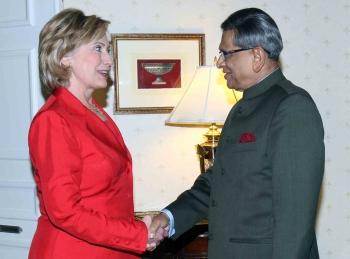 | « Back to article | Print this article |
 The United States on Saturday said India's position on the Nuclear Non-proliferation Treaty and the Comprehensive Test Ban Treaty will not impact the nuclear agreement between the two countries and expressed hope about moving forward with the landmark agreement.
The United States on Saturday said India's position on the Nuclear Non-proliferation Treaty and the Comprehensive Test Ban Treaty will not impact the nuclear agreement between the two countries and expressed hope about moving forward with the landmark agreement.
"We've said before that the resolution that was passed on Thursday unanimously by the United Nations Security Council does not have any bearing on our bilateral civil nuclear cooperation," Assistant Secretary of State for South and Central Asia Robert Blake said. Blake was briefing journalists after a bilateral meeting between Secretary of State Hillary Clinton and External Affairs Minister S M Krishna.
The United Nations Security Council had adopted a resolution urging all non-NPT signatories to join the treaty but India, which views it as discriminatory, refused to accept it.
The senior US official said that the discussion between Krishna and Clinton also included cooperation between India and the US on higher education, referring to a Lok Sabha bill that will enable more foreign participation in the higher education sector.
"There are a number of American universities which are very eager to do more. So we are very excited about that as well," he said.
During the meeting, Clinton hoped that the upcoming meeting between the foreign ministers of India and Pakistan would lead the relations between the two countries to a more positive footing.
The US position, he said, has always been that this is something that needs to be worked out between America's two friends -- India and Pakistan.
When asked if the external affairs minister lodged any protest about the US aid to Pakistan and it being used against India, Blake said, "I would rather not get into trying to talk about what the Indians said. I mean, I would prefer you just ask them directly about their positions, because particularly on this subject, it is quite a sensitive issue, and I don't want to mischaracterise their views".
During the meeting, Clinton also briefed Krishna on the latest development on the Iran front and the stand taken up by the US, along with Britain and France on Friday morning, an hour before the start of the G-20 Summit in Pittsburgh.
"The Secretary briefed External Affairs Minister Krishna on President Obama's announcement today morning with President (Nicholas) Sarkozy and Prime Minister (Gordon) Brown about our concerns regarding the new Iranian nuclear facility. She also welcomed the very strong statement that Russia made in this regard," he said.
Blake said Clinton made no request to her Indian counterpart on New Delhi cutting trade or relationship with Tehran.
"There were no requests at this meeting, but I think we have had very good dialogue in the past with India on nuclear issues and specifically with reference to Iran's nuclear ambitions, where I think Prime Minister Manmohan Singh has repeatedly made clear that they don't believe it is in India's interest to have another nuclear weapons state in the region," Blake said.
A major part of the discussion centred around Prime Minister Manmohan Singh's state visit in November to the US, a first to be hosted by the Obama administration. Clinton conveyed that Washington viewed New Delhi as a very important partner. The two dignitaries also discussed development issues in the region and security matters related to Pakistan, Afghanistan and Sri Lanka were also covered.
"They touched on the situation in Sri Lanka, where I think we have very similar views. Both of us agree on the importance of Sri Lanka resettling almost 300,000 internally displaced people who remain in the camps," Blake said.
Blake said Clinton hoped that the two countries would move forward on civil nuclear cooperation. "There are still some steps that have to be taken there, particularly with respect to signing liability legislation, getting the Indian parliament to approve liability legislation for our companies, but also to announce formally the reactor parks that will be set aside for US companies," said the US assistant secretary of state for South and Central Asia.
The steps taken to tackle climate change also came up for discussion, with Clinton underlining the importance of the US and India working together to achieve a successful outcome at Copenhagen.
"Most of the discussion during the meeting today with Foreign Minister Krishna concerned bilateral relations. The Secretary opened by recalling her very positive visit in July and the launch of the US-India Strategic Dialogue with External Affairs Minister Krishna at that time," Blake told reporters after the meeting. The top US diplomat underlined that Washington considers New Delhi as one of its most important partners in the 21st century.
"She (Clinton) told him today that the United States views India as one of our most important partners going forward in the 21st century," Blake said.
Clinton told Krishna that the US is working hard to prepare for the very important visit on November 24, the first state visit of the Obama administration.
"They also touched on some of the things that are already underway," he said, referring to the visit of Home Minister P Chidambaram earlier this month to Washington in a bid to boost counter-terrorism cooperation.
Image: US Secretary of State Hillary Clinton with External Affairs Minister S M Krishna | Photograph: Jay Mandal/On Assignment